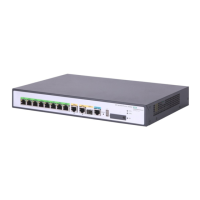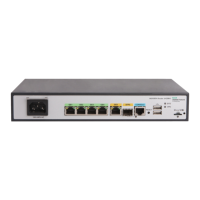16
Ste
Command
Remarks
3. Configure the ACCM value.
ppp accm hex-number
By default, the ACCM value is
0x000A0000.
The ACCM negotiation option
applies only to asynchronous links.
Configuring ACFC negotiation
PPP can compress the address and control fields of PPP packets to increase the payload size.
ACFC negotiation notifies the peer that the local end can receive packets carrying compressed address
and control fields.
ACFC negotiation is implemented at the LCP negotiation stage. After the ACFC negotiation succeeds,
PPP does not include the address and control fields in non-LCP packets. To ensure successful LCP
negotiation, PPP does not apply the compression to LCP packets.
HP recommends that you use the ACFC configuration option on low-speed links.
To configure the local end to send ACFC requests:
Ste
Command
Remarks
1. Enter system view.
system-view N/A
2. Enter interface view.
interface interface-type
interface-number
N/A
3. Configure the local end to
send ACFC requests by
including the ACFC option in
outbound LCP negotiation
requests.
ppp acfc local request
By default, the local end does not
include the ACFC option in
outbound LCP negotiation
requests.
To configure the local end to reject ACFC requests received from the peer:
Ste
Command
Remarks
1. Enter system view.
system-view N/A
2. Enter interface view.
interface interface-type
interface-number
N/A
3. Configure the local end to
reject ACFC requests received
from the peer.
ppp acfc remote-reject
By default, the local end accepts
the ACFC requests from the
remote peer, and performs ACFC
on frames sent to the peer.
Configuring PFC negotiation
PPP can compress the protocol field of PPP packets from 2 bytes to 1 byte to increase the payload size.
PFC negotiation notifies the peer that the local end can receive packets with a single-byte protocol field.

